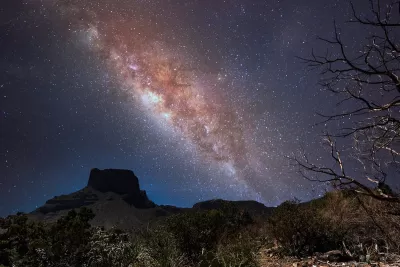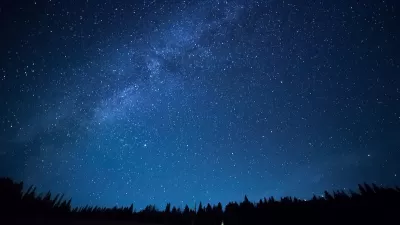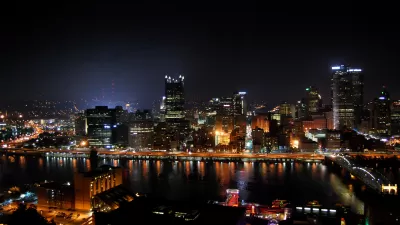Limiting light pollution can have beneficial effects for humans, animals, and the local economy.

Writing in Smart Cities Dive, Kalena Thomhave describes the efforts being made by three communities to protect their night skies and become certified Dark Sky Communities.
Earning the certification from DarkSky International can take years. Cities dedicated to the process, however, say it comes with a slew of benefits: They see not only the stars but also reduced energy consumption, lower electricity bills, healthier residents, improved environmental protection, increased ecotourism and even safer streets.
The certification program offers resources and information on the types of retrofits cities and towns can make to reduce light pollution while maintaining safety and security. Limiting glare can have benefits for people on the road, too. “Pedestrians and drivers on the road are less likely to be temporarily blinded by a bright light if it’s directed toward the ground properly.”
The three communities profiled in the article range from Bee Cave in the Texas Hill Country to a lakeside Indiana town and a Nevada city that hopes to boost ‘astrotourism’ to the area by keeping its nighttime conditions optimal for stargazing.
FULL STORY: 3 communities turning to the dark side with dark-sky retrofits

Study: Maui’s Plan to Convert Vacation Rentals to Long-Term Housing Could Cause Nearly $1 Billion Economic Loss
The plan would reduce visitor accommodation by 25,% resulting in 1,900 jobs lost.

North Texas Transit Leaders Tout Benefits of TOD for Growing Region
At a summit focused on transit-oriented development, policymakers discussed how North Texas’ expanded light rail system can serve as a tool for economic growth.

Using Old Oil and Gas Wells for Green Energy Storage
Penn State researchers have found that repurposing abandoned oil and gas wells for geothermal-assisted compressed-air energy storage can boost efficiency, reduce environmental risks, and support clean energy and job transitions.

Private Donations Propel Early Restoration of Palisades Playground
Los Angeles has secured over $1.3 million in private funding to restore the Pacific Palisades playground months ahead of schedule, creating a modern, accessible space that supports community healing after recent wildfires.

From Blight to Benefit: Early Results From California’s Equitable Cleanup Program
The Equitable Community Revitalization Grant (ECRG) program is reshaping brownfield redevelopment by prioritizing projects in low-income and environmental justice communities, emphasizing equity, transparency, and community benefits.

Planting Relief: Tackling Las Vegas Heat One Tree at a Time
Nevada Plants, a Las Vegas-based nonprofit, is combating the city’s extreme urban heat by giving away trees to residents in underserved neighborhoods, promoting shade, sustainability, and community health.
Urban Design for Planners 1: Software Tools
This six-course series explores essential urban design concepts using open source software and equips planners with the tools they need to participate fully in the urban design process.
Planning for Universal Design
Learn the tools for implementing Universal Design in planning regulations.
Ascent Environmental
Borough of Carlisle
Institute for Housing and Urban Development Studies (IHS)
City of Grandview
Harvard GSD Executive Education
Toledo-Lucas County Plan Commissions
Salt Lake City
NYU Wagner Graduate School of Public Service




























